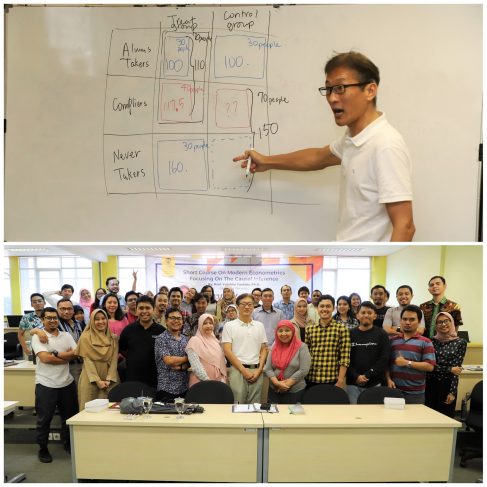Guest Lecture from Japan Taught Postgraduate FEB UI Students a Modern Econometrics for Casual Inference
Nino Eka Putra ~ Humas FEB UI
DEPOK – FEB UI Graduate School of Economics (PPIE) is equipped with modern basic econometrics knowledge by guest lecturers from Japan and takes place in room 401-402, Postgraduate Building, on Friday – Saturday (20-21 / 12/2019).
This lecture has the theme “Short Course On Modern Econometrics Focusing On The Causal Inference” which discusses about instrumental variables that are still related to the continuation of material that has taken place online through skype, namely introduction to causal inference, statistics vs. causal inference, experiments. This activity was opened by Diah Widyawati as Secretary of the FEB UI Postgraduate Study Program in Economics.
Hiroshima University Graduate School for International Development and Cooperation, Yuichiro Yoshida said the causal effect is a (potential) outcome with treatment or ‘potential’ results without treatment. The visual logic of the instrumental variable estimates the impact of ‘Going abroad or not’ on ‘Future Income’ using a randomly assigned IV.

The basic problem with causal inference is that we can only see one version of the results at the unit level. Counterfactual results will occur if treatment is different. Meanwhile, causality can be defined as the difference between actual and counterfactual results. Meanwhile, experiments control all other conditions except with or without fertilizer, but random experiments do not need to control other conditions.
In this basic econometrics, you must be able to do a causal reference to be able to evaluate the causal impact correctly. To get an idea about this causal reference, sometimes we often use complicated mathematics, many equations are technically very difficult. If you look at the text of causal references, some do explain well and are not complicated in presenting their ideas. But on the other hand, it is quite difficult for students to learn this concept with just a text book.
“There is currently a paradigm shift in conducting econometric analysis. This is very important for PPIE FEB UI students who are very close to regulations or laws (policy-oriented) and strong in analysis. This methodology is a new movement for academics and policy makers and has a true impact on the variations that occur,” he added.
He continued, feeling this will not be in vain. because UI students are capable and very talented. Not only in academic capacity but also their background. Many students come from government and have worked there for several years.
“They know the current issues and the real problems that occur in this country and the background is very good. One more thing that needs to be improved / refined is finding the right methodology for their ideas, and ‘cooking’ the ingredients and resources they have,” he concluded in a statement when interviewed. (Des)








